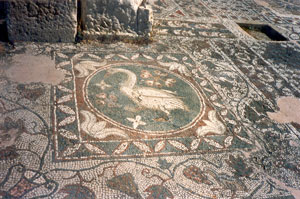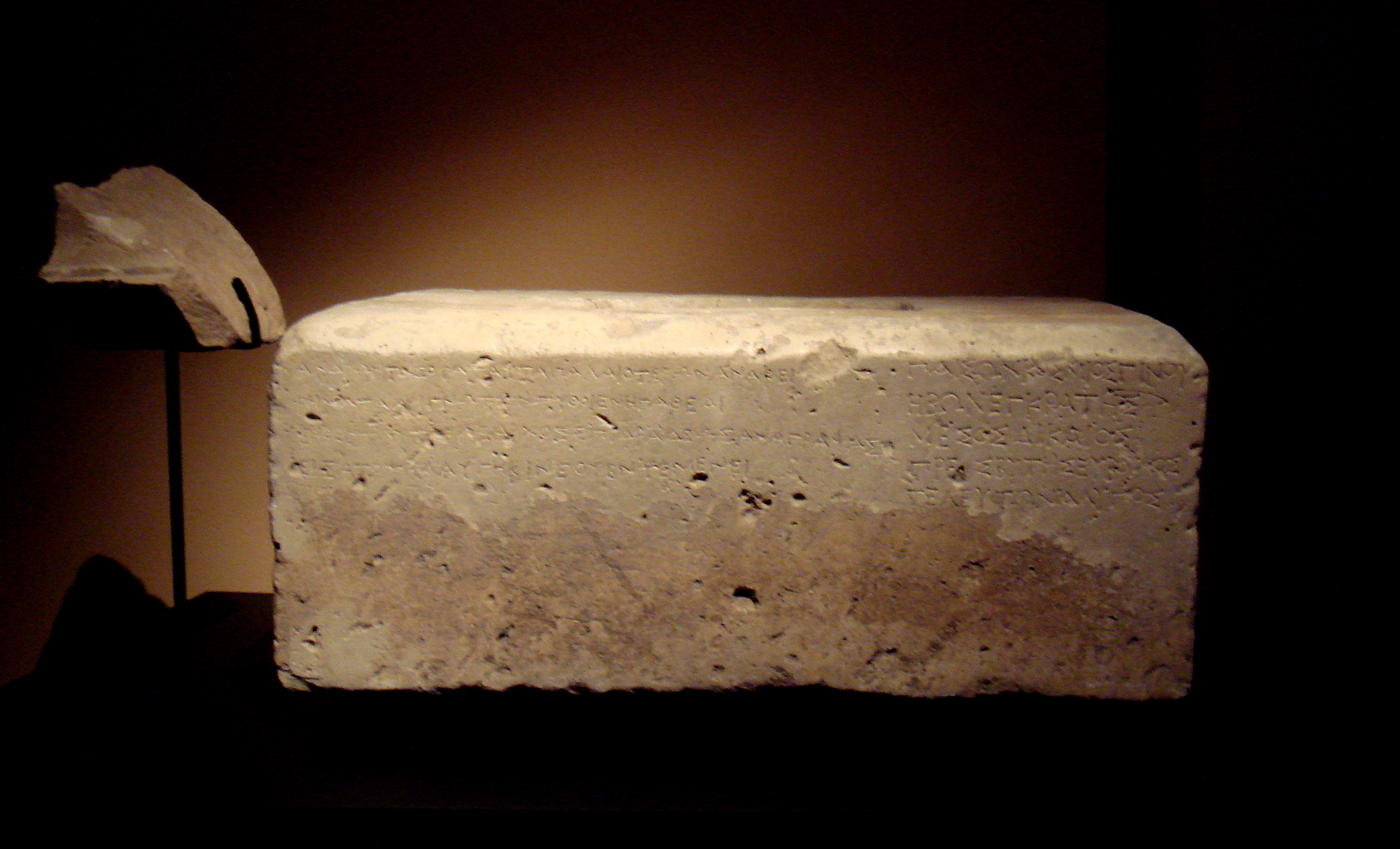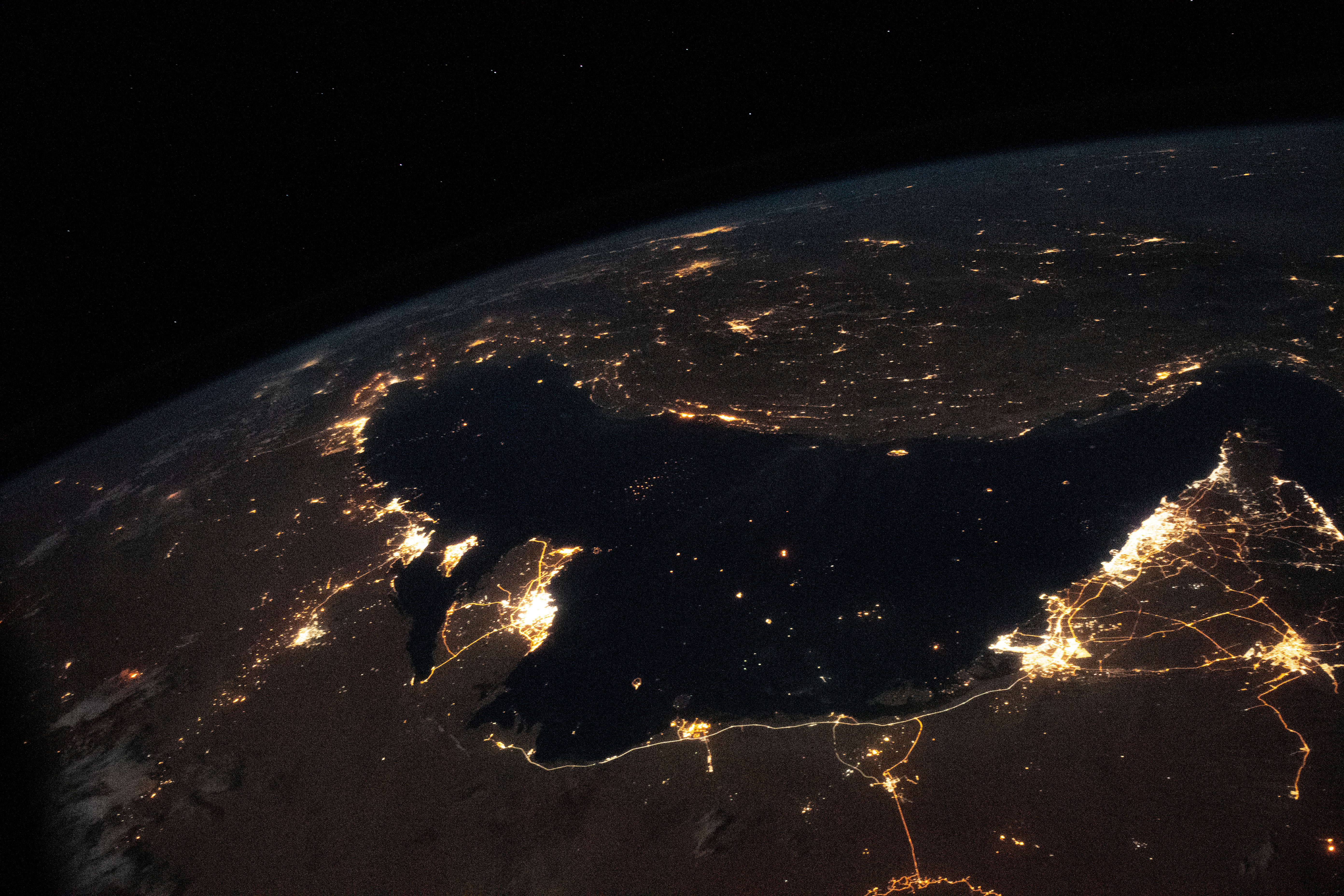|
Soloi
Soli or Soloi ( el, Σόλοι) is an ancient Greek city on the island of Cyprus, located next to the town of Karavostasi, southwest of Morphou (Guzelyurt), and on the coast in the gulf of Morphou. Since 1974 the site has been within the territory of the Turkish Republic of Northern Cyprus. Originally, Soloi was located in a much constricted geographical location. At its current location, the whole urban centre was designed by Solon during his 10-year trip, after whom the name Soloi is commonly attributed. Reyes, however, disputes this etymological origin, as the name Soloi appears on the Esarhaddon prism predating Solon's visit. Soloi was one of the ten city-kingdoms into which Cyprus was divided at the time. What remains today is mainly from the Roman period, most notably the mosaic floor of the basilica with its wealth of birds, animals and geometric designs and a picture of a swan. There is a theatre but it has been renovated to the point that it no longer has any atmosph ... [...More Info...] [...Related Items...] OR: [Wikipedia] [Google] [Baidu] |
Stasander
Stasander ( grc, Στάσανδρος; lived 4th century B.C.) was a Soloian general in the service of Alexander the Great. Upon Alexander's death he became the satrap of Aria and Drangiana. He lost control of his satrapies after being defeated by the Antigonids in the Wars of the Diadochi. Biography Stasander was born in the Kingdom of Soloi, in the 4th century B.C. At the time of his birth the ten city-kingdoms of Cyprus were vassal states of the Achaemenid Empire (Persians) which had conquered them either in 546 or 526. In May 334, the Achaemenids came into conflict with Kingdom of Macedon ruled by Alexander the Great. The Cypriots and Phoenicians formed the core of the Persian navy in the Mediterranean consisting of 400 ships. Upon receiving news of the devastating Persian defeat at the Battle of Issus, the Cypriot kingdoms defected to the Macedonians assembling at Sidon in the middle of May 332. Alexander pardoned the Cypriots on account that their allegiance to the Persians ... [...More Info...] [...Related Items...] OR: [Wikipedia] [Google] [Baidu] |
Solon
Solon ( grc-gre, Σόλων; BC) was an Athenian statesman, constitutional lawmaker and poet. He is remembered particularly for his efforts to legislate against political, economic and moral decline in Archaic Athens.Aristotle ''Politics'' 1273b 35–1274a 21 His reforms failed in the short term, yet Solon is credited with having laid the foundations for Athenian democracy.Stanton, G. R. ''Athenian Politics c. 800–500 BC: A Sourcebook'', Routledge, London (1990), p. 76.E. Harris, ''A New Solution to the Riddle of the Seisachtheia'', in ''The Development of the Polis in Archaic Greece'', eds. L. Mitchell and P. Rhodes (Routledge 1997) 103 His constitutional reform also succeeded in overturning most laws established by Draco. Modern knowledge of Solon is limited by the fact that his works only survive in fragments and appear to feature interpolations by later authors and by the general paucity of documentary and archaeological evidence covering Athens in the early 6th cen ... [...More Info...] [...Related Items...] OR: [Wikipedia] [Google] [Baidu] |
Drangiana
Drangiana or Zarangiana ( el, Δραγγιανή, ''Drangianē''; also attested in Old Western Iranian as 𐏀𐎼𐎣, ''Zraka'' or ''Zranka'', was a historical region and administrative division of the Achaemenid Empire. This region comprises territory around Hamun Lake, wetlands in endorheic Sistan Basin on the Iran-Afghan border, and its primary watershed Helmand river in what is nowadays southwestern region of Afghanistan. History In ancient times Drangiana was inhabited by an Iranian tribe which the ancient Greeks called Sarangians or Drangians. Drangiana was possibly subdued by another Iranian people, the Medes, and later, certainly, by the expanding Persian Achaemenid Empire of Cyrus the Great (559-530 BC). According to Herodotus, during the reign of Darius I (522-486 BC), the Drangians were placed in the same district as the Utians, Thamanaeans, Mycians, and those deported to the Persian Gulf. The capital of Drangiana, called Zarin or Zranka (like the Province), is ... [...More Info...] [...Related Items...] OR: [Wikipedia] [Google] [Baidu] |
Cyprus
Cyprus ; tr, Kıbrıs (), officially the Republic of Cyprus,, , lit: Republic of Cyprus is an island country located south of the Anatolian Peninsula in the eastern Mediterranean Sea. Its continental position is disputed; while it is geographically in Western Asia, its cultural ties and geopolitics are overwhelmingly Southern European. Cyprus is the third-largest and third-most populous island in the Mediterranean. It is located north of Egypt, east of Greece, south of Turkey, and west of Lebanon and Syria. Its capital and largest city is Nicosia. The northeast portion of the island is ''de facto'' governed by the self-declared Turkish Republic of Northern Cyprus, which was established after the 1974 invasion and which is recognised as a country only by Turkey. The earliest known human activity on the island dates to around the 10th millennium BC. Archaeological remains include the well-preserved ruins from the Hellenistic period such as Salamis and Kourion, and Cypr ... [...More Info...] [...Related Items...] OR: [Wikipedia] [Google] [Baidu] |
Alexander The Great
Alexander III of Macedon ( grc, wikt:Ἀλέξανδρος, Ἀλέξανδρος, Alexandros; 20/21 July 356 BC – 10/11 June 323 BC), commonly known as Alexander the Great, was a king of the Ancient Greece, ancient Greek kingdom of Macedonia (ancient kingdom), Macedon. He succeeded his father Philip II of Macedon, Philip II to the throne in 336 BC at the age of 20, and spent most of his ruling years conducting a lengthy military campaign throughout Western Asia and ancient Egypt, Egypt. By the age of thirty, he had created one of the List of largest empires, largest empires in history, stretching from Greece to northwestern Historical India, India. He was undefeated in battle and is widely considered to be one of history's greatest and most successful military commanders. Until the age of 16, Alexander was tutored by Aristotle. In 335 BC, shortly after his assumption of kingship over Macedon, he Alexander's Balkan campaign, campaigned in the Balkans and reasserted control ... [...More Info...] [...Related Items...] OR: [Wikipedia] [Google] [Baidu] |
List Of Ancient Greek Cities
A ''list'' is any set of items in a row. List or lists may also refer to: People * List (surname) Organizations * List College, an undergraduate division of the Jewish Theological Seminary of America * SC Germania List, German rugby union club Other uses * Angle of list, the leaning to either port or starboard of a ship * List (information), an ordered collection of pieces of information ** List (abstract data type), a method to organize data in computer science * List on Sylt, previously called List, the northernmost village in Germany, on the island of Sylt * ''List'', an alternative term for ''roll'' in flight dynamics * To ''list'' a building, etc., in the UK it means to designate it a listed building that may not be altered without permission * Lists (jousting), the barriers used to designate the tournament area where medieval knights jousted * ''The Book of Lists'', an American series of books with unusual lists See also * The List (other) * Listing (di ... [...More Info...] [...Related Items...] OR: [Wikipedia] [Google] [Baidu] |
Alexandria On The Oxus
Alexandria ( or ; ar, ٱلْإِسْكَنْدَرِيَّةُ ; grc-gre, Αλεξάνδρεια, Alexándria) is the second largest city in Egypt, and the largest city on the Mediterranean coast. Founded in by Alexander the Great, Alexandria grew rapidly and became a major centre of Hellenic civilisation, eventually replacing Memphis, in present-day Greater Cairo, as Egypt's capital. During the Hellenistic period, it was home to the Lighthouse of Alexandria, which ranked among the Seven Wonders of the Ancient World, as well as the storied Library of Alexandria. Today, the library is reincarnated in the disc-shaped, ultramodern Bibliotheca Alexandrina. Its 15th-century seafront Qaitbay Citadel is now a museum. Called the "Bride of the Mediterranean" by locals, Alexandria is a popular tourist destination and an important industrial centre due to its natural gas and oil pipelines from Suez. The city extends about along the northern coast of Egypt, and is the largest city on th ... [...More Info...] [...Related Items...] OR: [Wikipedia] [Google] [Baidu] |
Peripatetic School
The Peripatetic school was a school of philosophy in Ancient Greece. Its teachings derived from its founder, Aristotle (384–322 BC), and ''peripatetic'' is an adjective ascribed to his followers. The school dates from around 335 BC when Aristotle began teaching in the Lyceum. It was an informal institution whose members conducted philosophical and scientific inquiries. After the middle of the 3rd century BC, the school fell into a decline, and it was not until the Roman era that there was a revival. Later members of the school concentrated on preserving and commenting on Aristotle's works rather than extending them; it died out in the 3rd century. The study of Aristotle's works by scholars who were called Peripatetics continued through late antiquity, the Middle Ages, and the Renaissance. After the fall of the Western Roman Empire, the works of the Peripatetic school were lost to the Latin West, but they were preserved in Byzantium and also incorporated into early Islamic phil ... [...More Info...] [...Related Items...] OR: [Wikipedia] [Google] [Baidu] |
Clearchus Of Soli
Clearchus of Soli ( el, Kλέαρχoς ὁ Σολεύς, ''Klearkhos ho Soleus'') was a Greek philosopher of the 4th–3rd century BCE, belonging to Aristotle's Peripatetic school. He was born in Soli in Cyprus. He wrote extensively on eastern cultures, and is thought to have traveled to the Bactrian city of Ai-Khanoum (Alexandria on the Oxus) in modern Afghanistan. Writings Clearchus wrote extensively around 320 BCE on Oriental cultures, from Israel to Persia to India, and several fragments from him are known. His book "Of Education" (Greek: , ''Peri paideiās'') was cited by Diogenes Laërtius. Clearchus in particular expressed several theories on the connection between western and eastern religions. In "Of Education", he wrote that "the gymnosophists are descendants of the Magi". In another text, Josephus the first-century Romano-Jewish scholar claimed that Clearchus has reported a dialogue with Aristotle, where the philosopher states that the Hebrews were descendants of the ... [...More Info...] [...Related Items...] OR: [Wikipedia] [Google] [Baidu] |
Persian Gulf
The Persian Gulf ( fa, خلیج فارس, translit=xalij-e fârs, lit=Gulf of Persis, Fars, ), sometimes called the ( ar, اَلْخَلِيْجُ ٱلْعَرَبِيُّ, Al-Khalīj al-ˁArabī), is a Mediterranean sea (oceanography), mediterranean sea in Western Asia. The body of water is an extension of the Indian Ocean located between Iran and the Arabian Peninsula.United Nations Group of Experts on Geographical NameWorking Paper No. 61, 23rd Session, Vienna, 28 March – 4 April 2006. accessed October 9, 2010 It is connected to the Gulf of Oman in the east by the Strait of Hormuz. The Shatt al-Arab river delta forms the northwest shoreline. The Persian Gulf has many fishing grounds, extensive reefs (mostly rocky, but also Coral reef, coral), and abundant pearl oysters, however its ecology has been damaged by industrialization and oil spills. The Persian Gulf is in the Persian Gulf Basin, which is of Cenozoic origin and related to the subduction of the Arabian Plate u ... [...More Info...] [...Related Items...] OR: [Wikipedia] [Google] [Baidu] |
Arabian Peninsula
The Arabian Peninsula, (; ar, شِبْهُ الْجَزِيرَةِ الْعَرَبِيَّة, , "Arabian Peninsula" or , , "Island of the Arabs") or Arabia, is a peninsula of Western Asia, situated northeast of Africa on the Arabian Plate. At , the Arabian Peninsula is the largest peninsula in the world. Geographically, the Arabian Peninsula includes Bahrain, Kuwait, Oman, Qatar, Saudi Arabia, the United Arab Emirates (UAE), and Yemen, as well as the southern portions of Iraq and Jordan. The largest of these is Saudi Arabia. In the classical era, the southern portions of modern-day Syria, Jordan, and the Sinai Peninsula were also considered parts of Arabia (see Arabia Petraea). The Arabian Peninsula formed as a result of the rifting of the Red Sea between 56 and 23 million years ago, and is bordered by the Red Sea to the west and southwest, the Persian Gulf and the Gulf of Oman to the northeast, the Levant and Mesopotamia to the north and the Arabian Sea and the Indian ... [...More Info...] [...Related Items...] OR: [Wikipedia] [Google] [Baidu] |
Hiero Of Soli
Hiero or hieron (; grc, ἱερόν, "holy place") is a holy shrine, temple, or temple precinct in ancient Greece. Hiero may also refer to: Places and jurisdictions * Hieron, Caria, an Ancient city and former bishopric in Asia Minor, now Avsarkale is Turkey and Catholic titular see Hieron People Ancient * Hiero I, tyrant of Syracuse, Italy (478–467 BC) ** ''Hiero'' (Xenophon), a dialogue by Xenophon about Hiero I * Hiero II of Syracuse, tyrant of Syracuse (270–215 BC) * Hieron (potter), a 5th-century BC potter associated with Makron (vase painter) Modern * Hiero., the author abbreviation for botanist Georg Hans Emmo Wolfgang Hieronymus * Jay Hieron (born 1976), an American professional mixed martial arts fighter Fictional * Hiero Desteen, protagonist of two post-apocalypse novels by Sterling E. Lanier (''Hiero's Journey'' and ''The Unforsaken Hiero'') Other * Any one of a number of Aero-engines built to the designs of Otto Hieronimus in the Austro-Hungarian emp ... [...More Info...] [...Related Items...] OR: [Wikipedia] [Google] [Baidu] |







.png)